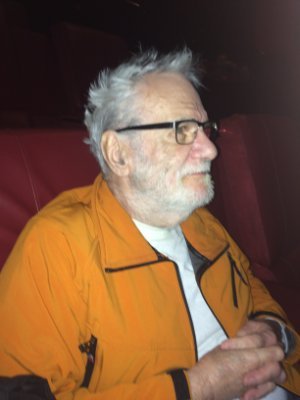
charleslippincott9
@chazlip9
Followers
311
Following
11
Media
2K
Statuses
2K
Old curmudgeon did time on Star Wars, Alien, Flash Gordon, Hitchcock, Judge Dredd, etc. Loves jazz, crime fiction, & schmaltzy walks on Saturn's Rings.
Planet Earth -- There's no other planet for us to all share.
Joined June 2019
These stills from Alien (1979) showcase key moments of Ridley Scott’s sci-fi horror. The first image features the Nostromo, a gritty industrial spaceship. The second shows its landing on LV-426, shrouded in mist. The third reveals the eerie, Giger-designed terrain.
1
12
62
These stills from Alien (1979) showcase key moments of Ridley Scott’s sci-fi horror. The first image features the Nostromo, a gritty industrial spaceship. The second shows its detail on the hull. The third reveals the eerie, Giger-designed space jockey and crew headshot
0
0
4
In Alien (1979), Ripley, Lambert, and Parker represent survival under pressure. Ripley's resourcefulness contrasts Lambert's paralyzing fear, while Parker's pragmatism and bravery shine through. Their dynamics reflect humanity's raw reactions to terror and the unknown.
0
0
4
In Alien (1979), Kane, Lambert, and Parker reflect diverse responses to danger. Kane’s curiosity leads to the crew’s downfall, as his recklessness brings the alien aboard. Lambert’s fear shows human vulnerability, often paralyzed by terror. Parker’s courage makes him a fighter,
0
2
6
In Alien (1979), Ripley, Jones the cat, and Parker represent resilience in the face of terror. Ripley’s quick thinking and drive for survival. Parker, brave and defiant, fights to the end. Jones, the ship cat, symbolizes innocence amid chaos, sharing Ripley’s escape.
0
0
3
In Alien (1979), Brett, played by Harry Dean Stanton, embodies the quiet, blue-collar worker, whose laid-back demeanor makes his death at the hands of the xenomorph all the more shocking. H.R. Giger, the visionary artist behind the xenomorph design, fused biomechanics.
0
0
1
In *Alien* (1979), Parker, Dallas, and Ripley represent distinct leadership and survival styles. Dallas, the pragmatic captain, tries to maintain control but underestimates the alien threat. Ripley’s resourcefulness and adherence to protocol position her as the true leader.
0
0
5
In *Alien* (1979), Parker and Brett, the ship's engineers, bring a working-class realism to the *Nostromo* crew. Parker, bold and outspoken, demands fair compensation and prioritizes survival. Brett, quieter and more submissive, follows Parker’s lead, often echoing his sentiments
0
2
4
The Nostromo and Narcissus models in Alien (1979) were crafted by model maker Roger Dicken, whose attention to detail brought Ridley Scott's vision of these iconic spacecraft to life. Parker (Yaphet Kotto), as the pragmatic and courageous engineer, was integral to the ship crew.
0
0
5
H.R. Giger’s biomechanical design influenced the Nostromo’s eerie, industrial interiors, blending machinery with organic forms. Brett’s quiet nature contrasts with this hostile environment, and his demise in the ship’s haunting corridors highlights Giger’s fusion of human & alien
0
0
7
In Alien (1979), Ash is the sneaky science officer with a hidden agenda, while Ripley’s the smart, moral one who isn’t fooled. Dallas, the captain, tries to keep control but struggles. Ripley’s the one who steps up, outsmarting both Ash and the alien in the end.
1
0
2
From Weyland-Yutani’s perspective, Ash is the perfect science officer—cold, efficient, and fully loyal to the company's mission. Ripley, however, becomes a problematic wildcard. Her survival instincts and moral compass threaten the company’s goals, after she uncovers Ash mission
0
0
1
Brett, played by Harry Dean Stanton in Alien (1979), serves as a quiet, relatable character whose tragic fate highlights the danger lurking aboard the Nostromo. Ridley Scott’s direction brought the ship to life with every detail—gritty, industrial, and worn-down.
0
0
4
Ridley trusted Giger’s unique, unsettling style to shape the alien and the Nostromo’s eerie, organic-looking interiors, creating a world where technology and biology were inseparably fused. This partnership blended Scott's direction with Giger’s haunting design making perfection.
2
9
30
Ridley Scott faced numerous challenges with the tight budget forced creative set design and special effects work, leading to Giger's eerie, organic designs becoming a key element. Filming in cramped, industrial sets added a claustrophobic feel but made the production demanding.
1
8
62
Tom Skerritt, Yaphet Kotto, and Veronica Cartwright all brought their own unique vibes, making the crew feel like regular folks just trying to survive an alien nightmare. Their performances, mixed with Ridley’s tension-building, turned Alien into the epic, chilling classic.
0
1
3
In *Romulus*, the alien differs greatly from its portrayal in *Alien* (1979). The xenomorph in *Alien* is a terrifying, a force of nature, designed to hunt and kill, the alien in *Romulus* takes on a more nuanced role. It’s less about pure horror and more about the unknown.
0
0
2
With all the dim lighting and tight spaces, it can basically hide anywhere, making it feel like it’s lurking just out of sight, waiting to strike. The worst part? You never really know when it’s coming, so the whole time you’re on edge, thinking it could pop out from the dark.
0
0
2
In the movie *Alien*, the facehugger is this creepy, quick creature that latches onto Kane’s face with no mercy, looking all spider-like and super unsettling. But in the book, the facehugger has a bit of a weird twist—it actually has *one eyeball*. YUP!
1
9
90
Finding the space jockey was an inevitability, wasn’t it? A relic of a forgotten species, sitting there in its seat, fused with its ship like some twisted, mechanical-cum-biological entity. It’s all part of the bigger picture, of course.
0
0
2
